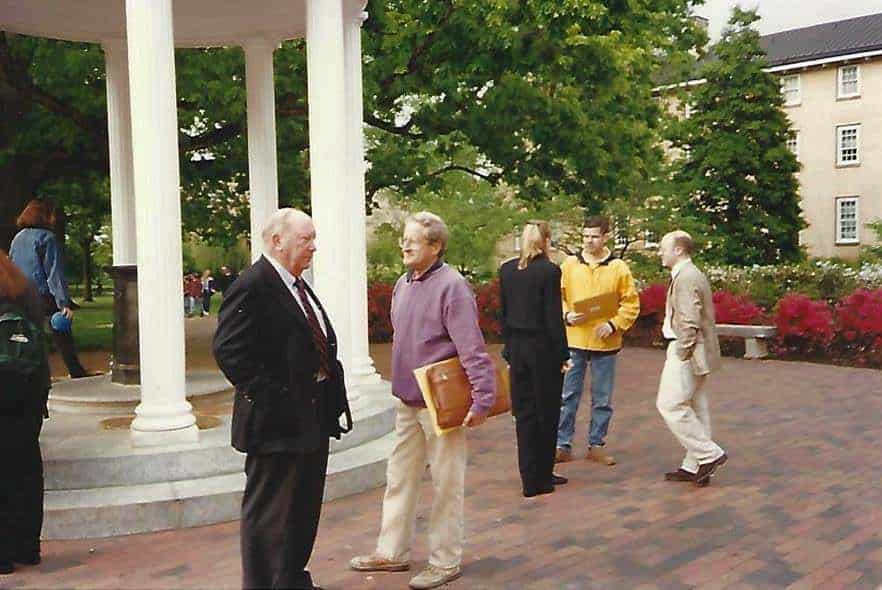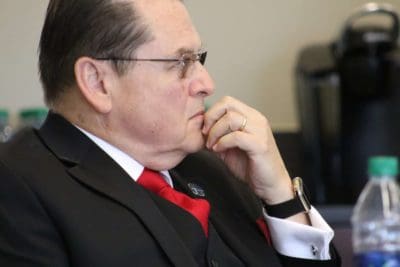

For many practitioners of politics and government in North Carolina, the route to their positions of public influence went through Thad Beyle’s political science classes at the University of North Carolina at Chapel Hill. Over four decades, he served as an exemplar of an engaged professor at a public university.
Thad died a week ago. As a faculty member, he was a colleague and collaborator — and even more a friend. His career illustrates the value of a student-oriented, public-spirited educator.
Thad and his wife Pat arrived in North Carolina in mid-1964, shortly after he earned his PhD at the University of Illinois. He had won a young-professor grant from the Ford Foundation and Carnegie Corporation to work in a governor’s office, and he chose North Carolina where he spent the last six months of Gov. Terry Sanford’s term and the first six months of Gov. Dan Moore’s term.
Subsequently, Sanford hired Thad onto the team of researchers for his book, Storm over the States. Thad developed a career-long research interest in gubernatorial powers and transitions. His advice to new governors: Don’t appoint your campaign manager as chief of staff.
In 1967, Thad became a UNC faculty member. Dick Richardson joined the political science faculty three years later. The Beyle and Richardson families resided in the same Chapel Hill neighborhood. When I telephoned him to talk about Thad, Dick spoke at length about their “quite personal’’ bond. Dick had fallen ill in the early ’70s, and Thad visited daily, treated him “just like a brother,” and “was instrumental in my being healed.”
Richardson went on to become chair of the political science department and provost, the university’s chief academic officer. He recalled how Thad, while a Democrat, served as mentor for students across party and ideological lines. “His office was filled all the time with undergraduates,’’ Dick said, adding that he would encourage students: “Tell Thad what you are, tell Thad what you believe and he’ll take you where you are.”
In his University Day address in 2017, Gov. Roy Cooper mentioned Thad as one of the UNC faculty influential in his undergraduate education. Thad served for 10 years on the board, for a time as chair, of the NC Institute of Political Leadership, which trained prospective candidates for public office. He was a board member from 1977 to 1993, including nine years as chair, of the NC Center for Public Policy Research, which is now an affiliate of EducationNC. (Here is a link to a 1990 analysis of gubernatorial powers written for the NC Center, still relevant to today’s debates.)
I met Thad shortly after moving to North Carolina in the early 1970s. For me and other newspaper reporters at that time, he served as an informed analyst of public affairs. In turn, he invited me to his classes and used my columns in his voluminous “course pack’’ of readings.
He was not a powerful lecturer; rather, he taught by sparking discussion. He also gave students the opportunity to publish political-trends research in NC DataNet, which he produced with his professorship stipend. For years it was a mimeographed publication mailed to a small list of recipients.
Once I asked him for his NC DataNet publication schedule. “It’s like a Mexican bus,’’ he replied. “When we fill it up, we send it out.”
As the field of political science at Chapel Hill and elsewhere grew more quantitative and theoretical, Thad felt increasingly out of sync and isolated in his own academic field. He wanted to keep working at both research and practice.
Soon after I joined the UNC faculty in 1997 as founder of the UNC Program on Southern Politics, Media and Public Life (now known simply as the Program on Public Life), Thad asked to take on a role in the program. He served as associate director and later senior research fellow. The program became the vehicle for publishing NC DataNet. Thad recommended Ryan Thornburg, his former student, as the program’s first full-time staff person. Ryan is now director of the news lab at the UNC School of Media and Journalism. (A NC DataNet archive is here.)
For years, Thad was a regular participant in Program on Public Life seminars for state legislators and journalists. Through the program, we collaborated on a study of campaign finance, and consulted in the formation of the Pew Center on the States.
Thad gave the program academic heft. But even more important was his long career of teaching and public service, of scholarship and mentorship, that enriched the politics and policy of North Carolina.


